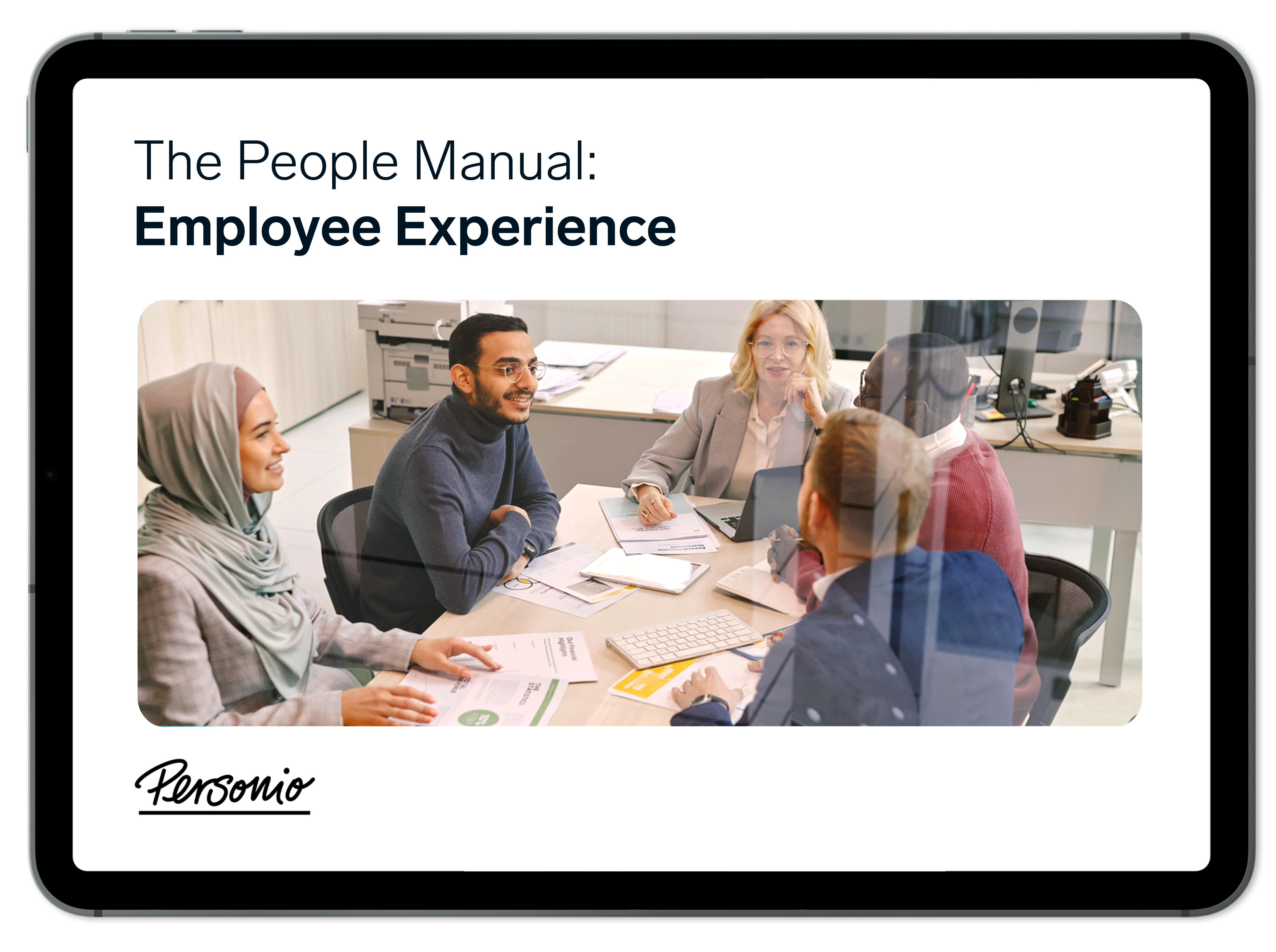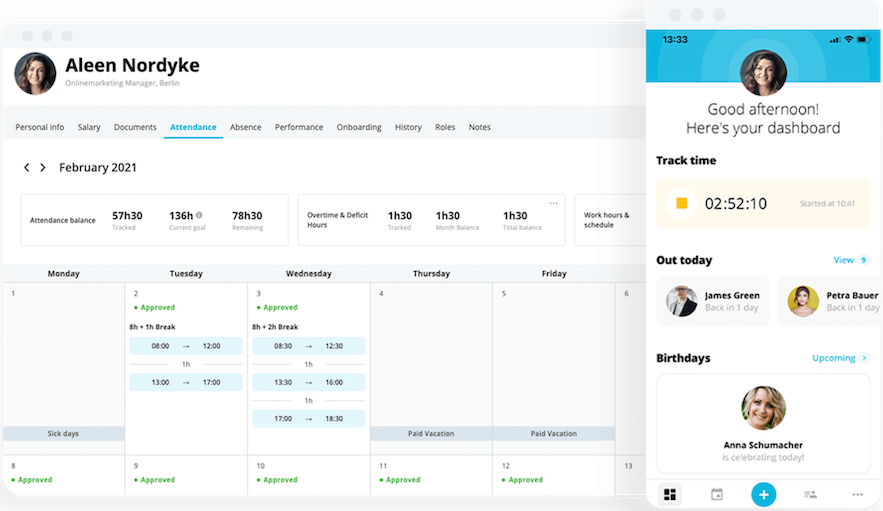What Are the Sunday Scaries? A Guide for Employers
No employer wants to think that their employees dread coming to work. But studies suggest that the ‘Sunday scaries’ are a real thing — even for employees who like their jobs. In this article, we’ll discuss what this phenomenon actually is, dive into some of the causes behind it, and explore some of the things that HR and management can do to help.
Ready to focus on every element of employee experience? Download our guide.Contents
- 1What Are the Sunday Scaries?
- 2Are the Sunday Scaries Actually Real?
- 3What Causes the Sunday Scaries?
- 4How Do the Sunday Scaries Affect Employees?
- 5What Does This Mean for Employers?
- 6How Can HR and Managers Help Combat the Sunday Scaries?
- 7Combatting Burnout and Stress by Respecting Work-Life Balance
What Are the Sunday Scaries?
The Sunday scaries are feelings of anxiety or even dread about work that usually start on a Sunday afternoon and build up into the evening. This feeling might also be called the ‘Sunday night blues’ or the ‘Sunday feeling’.
Although things like stressful work environments can definitely contribute to the problem, the Sunday scaries are not necessarily a sign that someone is unhappy at work. However, if your employees are persistently feeling awful on Sunday evenings, this could be a sign of a wider issue.
Are the Sunday Scaries Actually Real?
There have been many studies into the so-called Sunday scaries that suggest it’s a real phenomenon that affects many people. For example, a recent survey commissioned by the Office for Health Improvements and Disparities (OHID) found that almost 67% of adults in the UK regularly experience the Sunday scaries. Among those aged 18–24, this figure rises to 74%.
What Causes the Sunday Scaries?
It would be logical to assume that the Sunday scaries are only experienced by people who hate their jobs or have a reason to dread going to work. But the fact that the problem is so widespread suggests that this isn’t the case.
So, what are the causes of this Sunday night anxiety that seems to be impacting so many people? Here are a few of the factors that could be contributing to the problem.
General Anxiety About the Week Ahead
Even for employees who generally like their jobs, anticipation about the coming week can lead to anxiety on a Sunday evening. Overloaded to-do lists, pressure to perform well or just uncertainty about what they’ll be faced with throughout the week can all have an impact.
And another factor at play is that it’s much harder to ‘switch off’ than it used to be. Many employees are tempted to peek at their emails or chat apps on a Sunday to find out what the week will look like — which can worsen feelings of anxiety or dread.
Limited Relaxation and Feelings of Wasted Time
The weekend is the only real time that most employees have to relax and enjoy themselves each week. But it’s also the only time that many have to run errands, do household chores and get things done.
One factor that can add to the Sunday scaries is the feeling of having ‘wasted’ your time off. Paradoxically, this could be either because you haven’t found enough time to relax over the weekend, or because you haven’t been productive enough.
Inadequate Sleep Creating a Vicious Cycle
A lack of sleep is often cited as one of the biggest contributors to the Sunday scaries. In the worst cases, this can turn into an endless loop of sleeplessness and stress. The more anxious someone is, the less likely they are to get a good night’s sleep. This, in turn, makes Monday mornings harder — which makes the Sunday scaries more likely to reappear the following week.
Changes to Work Practices and Routine
There’s some suggestion that employees might be more prone to the Sunday scaries when they’re forced to change their routine and working habits. And the fact that many organisations are now asking employees to return at least partially to the office after several years of (mostly) remote working could be worsening feelings of anxiety.
An article from HR News provides some evidence for this theory. According to the article:
Google searches for ‘Sunday scaries’ increased by 100% when many organisations began returning to the office in 2021
Searches for ‘office anxiety’ increased by 32% between January and November 2022
In the same period, searches for ‘Monday blues’ increased by 31%
Half a decade of insights on employee experience

Our "People Manual" covers all things related to employee experience and developing initiatives that result in more engaged employees. Grab your free copy right now.
Download It TodayHow Do the Sunday Scaries Affect Employees?
As well as general feelings of stress and anxiety, employees might experience physical symptoms like upset stomachs, insomnia and headaches. Naturally, this can impact their quality of output and quality of work — which can make feelings of anxiety around work even worse.
What Does This Mean for Employers?
When employees regularly experience the Sunday scaries, this can have a negative impact on their organisation as a whole. For example, it could lead to:
Lower productivity: Employees who are tired, upset or stressed typically don’t do their best work. You might see a drop in productivity if you’re not helping employees to keep the Sunday scaries in check.
Lower engagement: These employees are also less likely to be fully engaged and motivated at work — which can have serious consequences for businesses.
Increased absenteeism: You may also find that employees take more sick days, particularly on Mondays. Over time, this can have a big impact on productivity and performance across the organisation.
Presenteeism: This is when employees are physically present in the workplace, but not performing to their full potential because of illness or injuries. According to research from the Centre for Mental Health, presenteeism from mental ill health alone costs the UK economy £15.1 billion every year (almost double the cost of absenteeism).
Increased staff turnover: Employees who frequently feel tense or stressed at work are more than three times more likely to quit, according to CNBC. For businesses, this can result in staff shortages and increased costs for recruitment, onboarding and training.
How Can HR and Managers Help Combat the Sunday Scaries?
A quick Google search for the Sunday scaries will bring up hundreds of articles that aim to help employees fight their Sunday afternoon anxiety. But, while these might contain some useful advice, HR and management should also be doing what they can to help take the pressure off employees — and ensure they feel nothing but relaxed and rested on a Sunday evening.
Keep a Close Eye On the Problem
Not every employee suffers from the Sunday scaries. And while it won’t ever hurt to invest in improving engagement and decreasing stress, there’s no point in spending a lot of time and resources on it if you don’t actually have a problem.
The answer? Use a program like CultureAmp or Leapsome to send out an employee engagement survey that asks your teams whether they experience the Sunday scaries. Even better: make that a regular survey. An increase in employees feeling the Sunday scaries could be indicative of a bigger problem, so the sooner you’re aware of it, the better.
Cancel the Monday Meeting
Starting the week with a team meeting can be a good way to regroup with colleagues after the weekend. However, it can also be a big cause of stress for employees, with some feeling like they need to start early on Mondays (or even work over the weekend) just to prepare.
To avoid this, consider cancelling that meeting — or at least moving it to the late morning or afternoon. This way, you’ll still be able to align with your team on a Monday, but everyone will have time to clear their inbox first.
Make Better Use of Your Employee Assistance Programme
Employee assistance programmes (EAPs) can be very effective in helping employees to combat feelings like stress and anxiety. However, simply telling your employees that the EAP exists may not be enough, as those who are already stressed and disengaged are less likely to voluntarily seek out assistance.
Instead, HR should try to be more intentional about promoting the EAP. This might mean physically showing employees the assistance that’s available when you feel they are struggling, or even delivering a company-wide blog post or video about the EAP and what it can provide.
Stop Emailing At the Weekend
Managers often send messages and emails to employees over the weekend, in the hope that they’ll see them on Monday morning. However, since many employees have their email accounts and chat platforms like Slack connected to their phones, they’ll often see these messages (and start thinking about work) immediately, even if this wasn’t their manager’s intention.
Ideally, managers should avoid sending messages to their employees over the weekend altogether. But if they absolutely must send something, they should use email scheduling to ensure it won’t interrupt their time off.
A decade of insights on corporate culture

Download one of our latest People Manuals on the subject of corporate culture and become a subject matter expert today.
Download it todayCombatting Burnout and Stress by Respecting Work-Life Balance
The Sunday scaries might be a relatively new buzzword, but they’re part of an overall culture of workplace stress that we’re all familiar with. HR and management need to work hard to help employees combat stress before it leads to total burnout.
Often, it comes down to helping employees to maintain a healthy work-life balance, which might mean providing flexible scheduling options, allowing those who want to work remotely to do so and encouraging employees to take all of the holidays they’re entitled to.
Above all, it’s about creating a corporate culture that doesn’t promote ‘going above and beyond’ by putting in long hours, and that encourages employees to take care of themselves. After all, in uncertain economic times like these, no company can afford to have their employees stressed, disengaged or burned out.
